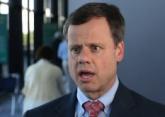Among 29 patients evaluable for response, 8 (27.6%) had a response, including 3 complete responses, and 5 partial responses. There were 3 cases with stable disease, and 14 with disease progression. Four patients did not have a response assessment due to early discontinuation.
Of the eight responders, all had a more than 30% decrease in the size of target lesions.
The patients tolerated the therapy well, with 85% having either grade 1 or 2 adverse events, or none, and no new safety signals were seen. Grade 3 or 4 adverse events occurred in five patients, with no event occurring more than once, but some occurring concurrently in more than one patient. These events included AST elevation, dehydration, hypercalcemia, myalgia, myositis, neuromyopathy, maculopapular and pruritic rashes, rhabdomyolysis, thrombocytopenia, and toxic encephalopathy.
The atezolizumab study was sponsored by Genentech. The pembrolizumab study was supported by Merck. Dr. Petrylak disclosed research funding and travel honoraria from Genentech. Dr. Plimack is an advisory board member for Merck and receives institutional research funding from the company. Dr. Hahn is a consultant/advisor to Genentech and Merck, and receives institutional research funds from the companies.
